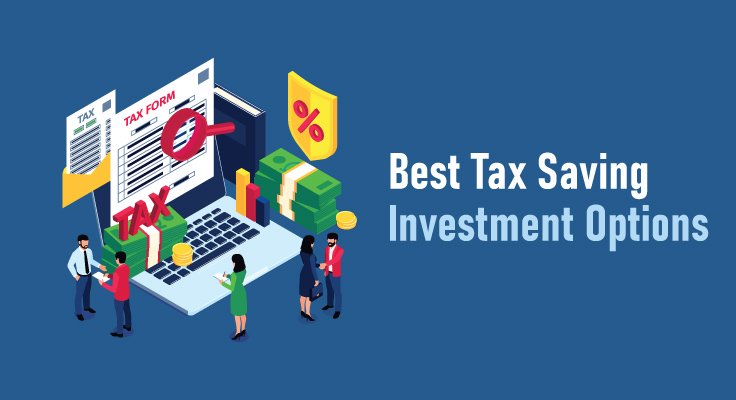Are you looking for ways to save or multiply money? If so, saving up on taxes also needs to be one of them. If you are thinking, ‘Is that even possible?’ Yes! It is. That is what we are here to talk to you about. There are some great ways to save on taxes while investing. However, the key is where you invest and how. Keep reading to find out.
Tax-Saving Investment Options
Here are some great ways you can Save tax:
1. PPF or Public Provident Fund
In India, the Public Provident Fund (PPF) is a popular long-term savings system that assists individuals in building wealth and gives various tax benefits.
- Section 80C: Contributions to the PPF account are deductible under Section 80C of the Income Tax Act, subject to a certain maximum. The maximum deduction under Section 80C is Rs. 1.5 lakh per financial year is the primary way to save tax.
- Exemption: The interest generated in the PPF account is tax-free. This implies that interest income is not considered part of the overall income for tax purposes. The interest is compounded yearly.
- Tax-Free Maturity Proceeds: The maturity amount (including principal and interest) received at the end of the 15-year lock-in term is fully tax-free. This makes PPF one of the rare vehicles in which both the principal and interest are tax-free.
2. EPF or Employee Provident Fund
Employee Provident Fund (EPF) is a retirement savings plan for salaried employees in India. EPF payments offer many tax benefits to both employees and companies.
- Section 80C: Section 80C of the Indian Income Tax Act allows employers to deduct employee payments to the EPF. The maximum deduction under Section 80C is Rs. 1.5 lakh per financial year.
- Interest Earnings: The interest gained from EPF contributions is tax-free. The interest rate is set by the Employees’ Provident Fund Organisation (EPFO) and compounded yearly.
- Tax-Free Withdrawals: EPF withdrawals after five years of continuous service are tax-free. If an EPF withdrawal is taken before five years, it is taxed unless there are certain conditions, such as unemployment or medical reasons.
- Tax Benefits on Pension Contributions: The Employee Pension Scheme receives 8.33% of the employer’s contribution. This contribution is also tax-exempt.
- Tax Benefits on Job Change: If an employee switches employment but continues to contribute to the EPF, the tax benefits remain. The EPF account stays unchanged, but the accrued amount is transferred to the new employer’s EPF account.
3. ELSS or Equity-Linked Savings Scheme
Equity-Linked Savings Schemes (ELSS) are a kind of mutual house fund that provides tax benefits to investors in India.
- Section 80C: ELSS investments are deductible under Section 80C of the Income Tax Act. The highest deduction limit under Section 80C is Rs. 1.5 lakh per financial year. The amount invested in ELSS can be deducted from your total taxable income.
- Dividend Income: ELSS funds may pay dividends, which are tax-free for investors. However, it is crucial to note that dividends are liable to dividend distribution tax (DDT) before they are delivered.
- Long-Term Capital Gains Tax Benefit: Gains from ELSS investments held for more than a year are considered long-term capital gains (LTCG). LTCG on equities funds, including ELSS, was taxed at 10% on profits over Rs. 1 lakh. However, profits made before January 31, 2018, were grandfathered.
4. NSC or National Savings Certificate
The Government of India offers a fixed-income savings product known as the National Savings Certificate (NSC).
- Section 80C: Investments are eligible for deduction under Section 80C of the Income Tax Act.
- Interest Accrual and Taxation: The interest on NSC is compounded yearly but not paid until maturity. The interest accrual is deemed reinvested and can be deducted under Section 80 C.
5. NPS or National Pension System
The National Pension System (NPS) is a voluntary, long-term retirement savings initiative meant to help Indian residents save for their pensions. It offers a variety of tax breaks to encourage people to enroll in a pension plan for their retirement.
- Section 80CCD(1): Individuals can claim a deduction for donations to their NPS account under Section 80CCD(1) of the Income Tax Act. The maximum deduction permitted is 10% of the individual’s wage (basic salary + dearness allowance) or 20% of gross total income for self-employed persons, with a combined ceiling of ₹1.5 lakh under Section 80C and 80CCD(1).
- Section 80CCD(1B): Section 80CCD(1B) allows for a deduction of up to ₹50,000 for contributions to the NPS Tier I account. This deduction exceeds the maximum allowed by Sections 80C and 80CCD(1).
- Section 80CCD(2): Section 80CCD(2) allows employers to deduct contributions paid to their employees’ NPS accounts. The deduction is restricted to 10% of the employee’s base wage (plus the dearness allowance).
6. Tax-Saving Bank Fixed Deposits
Tax-Saving Fixed Deposits (FDs) are unique fixed deposit programs offered by banks in India that have a lock-in period and provide tax benefits under Section 80C of the Income Tax Act.
- Section 80C: Investments made in Tax-Saving Fixed Deposits are eligible for deductions under Section 80C of the Indian Income Tax Act.
7. Senior Citizens Savings Scheme
The Older People Savings Scheme (SCSS) is a government-backed savings plan for India’s older people.
- Section 80C: Investments in the Senior Citizens Savings Scheme are deductible under Section 80C of the Income Tax Act.
8. Rajiv Gandhi Equity Savings Scheme
The Rajiv Gandhi Stock Savings Plan (RGESS) was a plan created by the Indian government to encourage first-time retail investors to engage in the stock markets while also providing tax benefits.
- Section 80CCG: Investments made in qualified securities or mutual fund units through the RGESS were eligible for deductions under Section 80CCG.
Conclusion
While you seek investment options everywhere, looking for ones that also give you tax benefits is a must. This ensures that not much is chipped off your investment’s earnings. Leaving you with the entire returns to attain your financial goals. Though taxes are not the sole basis for deciding on an investment option, they can be one of the good parameters in choosing the right instrument for you.
Also Read: Highest Taxed Countries in the World [Updated 2024]












